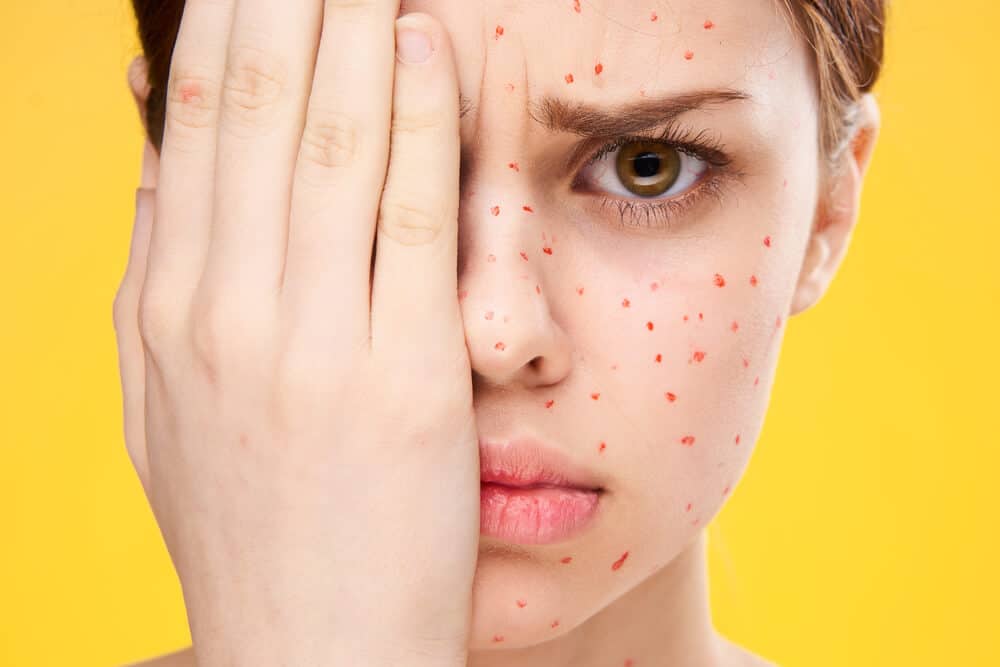As a glasses wearer, you know the great feeling of investing in a new pair of glasses. But what happens a few days in, when you notice the glasses are irritating your skin?
If you find after your yearly eye exam that your glasses are irritating your skin, it can cause various reactions depending on your skin type. Ways your skin can react to wearing your eyeglasses include

- Pimples because of your eyeglasses frames
- Glasses marks on the nose
- Blisters from eyeglasses pads
- Contact dermatitis or another eyeglasses allergy
- Redness on your nose, behind your ears, or around your eyes
- Itchy or sore somewhere on your face
No matter the symptoms of skin irritation on the nose from glasses or another part of your face, it is important to address the cause of irritation properly. You do not want the reaction to spread throughout your face and make you feel more uncomfortable.
If it’s irritation from what the eyeglasses are made of, you will have to find a new pair that does not cause skin reactions. Maybe it is the way your glasses are laying on your face or it could be as simple as washing your face more often. Let’s take a look at all possible angles of skin irritation related to your eyewear.
What Causes Skin Irritation On the Nose From Glasses?
If redness forms on your eye pads or around the bridge of your nose, the rash from glasses comes from contact dermatitis. Hence, your skin is reacting to a substance contained in your eyewear because you may be allergic to one or more of said substances.
If you feel that you have an allergy to your new pair of eyeglasses, visit your local allergist for a formal diagnosis. Then, you can find alternative eyewear that will not cause such reactions.
Plastics Allergy and UVA Absorbers
Various types of plastic are used to make eyeglasses. It forms eyeglasses frames, while silicone plastic creates the nose pads that help the glasses rest comfortably on your face.
You may even be allergic to one of the UVAs (ultraviolet light absorbers) found in many plastics to extend their lifetime, called Tinuvin P. It is a UVA absorber that is under the hydroxyphenyl benzotriazole class, which helps your eyeglasses to last for many years.
Nickel Allergies
There is a tiny metal piece within the eye pads, usually made with nickel. Sometimes the coatings on your eyeglasses are sourced from nickel alloys. People with prescription eyeglasses have more chances of contracting a nickel allergy than those with non-prescription eyeglasses.
If you find that you have a nickel allergy, you may have to get hypoallergenic eyeglasses that do not have nickel in them to prevent glasses from irritating your skin.
Other Allergens
Here are other types of allergens that could be causing skin reactions because of wearing your eyeglasses:
- Rubber
- Solvents
- Dyes
- Antioxidants
- Waxes
- Cosmetics
Glasses Marks On the Nose: How to Prevent Them
Here are some prevention techniques to reduce irritation from your new pair of eyeglasses.
Proper Fit of Eyeglasses
If your eyeglasses do not fit properly, it can cause glasses marks on the nose. Find a frame that comfortably fits over your face. If they are falling off or leaving marks on your nose, you may have to find a new frame that lines up with your face’s measurements better.
Use of Cushioned Pads and Nose Grips
If you experience the dreaded glasses marks on the nose, then invest in a couple of pairs of nose pads. They easily install on the nose grips of your eyeglasses. Rotate between the two pairs of nose pads by washing the one pair you remove from your glasses every few days and placing the clean pair on.
Regular Cleaning of Eyeglasses Frames and Lenses
The oils and dirt from your face can get trapped on the frames and lenses of your eyeglasses. First, wash your hands to free them of bacteria that could transfer onto your eyeglasses. Then, run your eyeglasses under tepid water. Use a dish soap that does not contain additional lotions in it, preferably an antibacterial one, to gently wash the lenses.
Rinse the glasses under more tepid water, then dry them with a microfiber cleaning cloth so no streaks form on your lenses.
Alternating Between Multiple Pairs of Eyeglasses
Rather than wear just one set of eyeglasses, have at least two or three pairs that you alternate wearing. Of course, be sure that you follow the cleaning method above for each pair of eyeglasses before placing them on your face.
Reduce Glasses Irritating the Skin
Here are some relief techniques for skin irritation on the nose from glasses or allergies that you may be experiencing.
Apply Over-the-Counter Creams or Ointments
Any over-the-counter hydrocortisone cream can help with skin irritation. Brands such as Benadryl or CeraVe have ointments on the market that you can use around your nose or near your ears to get the anti-itch relief that you need.
Use Cold Compresses
If your skin burns from the irritation that your eyeglasses are causing, especially if you have contact dermatitis on your eyelids, use a cold compress for relief. Fill a bag with ice and wrap it up in a washcloth. Alternatively, use a hot and cold compress that you place in the fridge for half an hour to get cold.
Try Home Remedies
Try home remedies such as tea tree oil or aloe vera to relieve skin irritation on the nose from glasses. Aloe vera helps with skin flakiness, making it smoother. Tea tree oil is a natural anti-inflammatory that can soothe any inflamed parts of your face caused by your eyeglasses.
Seeking Medical Treatment
Prescription creams such as beclometasone are a stronger version of hydrocortisone for itchy skin that won’t go away with an over-the-counter cream. If irritation continues, visit your local allergist to conduct different tests to discover if you are allergic to one of the substances in your eyeglasses.
Frequently Asked Questions
Now that you know more about eyeglasses allergies and prevention and relief tips for glasses-irritated skin, here are your answers to frequently asked questions about the topic.
What Is the Difference Between Skin Irritation and an Allergy?
Contact dermatitis from a skin allergy means that something in your eyeglasses is causing a skin reaction or rash from glasses. Irritation is because of repeated exposure to a substance from your eyeglasses, but you are not necessarily allergic to it, as it only causes skin irritation on the nose from glasses or in another area.
Can Wearing Eyeglasses Cause Infections?
If you do not clean your eyeglasses regularly, it can cause various infections on your skin and eyes. You may get bumps on one or both eyelids, suffer from pink eye, or have another type of eye-related infection.
How Often Should You Clean Your Eyeglasses?
Disinfect your eyeglasses at least once every couple of days, if not once a day. Regularly cleaning your glasses reduces the bacteria and oils that accumulate on them.
Seek the Vision Care You Need Today!

Various prevention and relief tips can help reduce the irritation of glasses on the skin. Find the proper fit of eyeglasses and find a pair with cushioned pads. Use a cold compress or a chosen home remedy for relief from irritation.
You deserve to feel confident and proud while wearing your eyeglasses, so find a prevention or relief solution that works best for you. You should seek medical attention from an allergist if the symptoms do not clear in a couple of weeks. Contact Art of Optiks today for a comprehensive eye exam.

